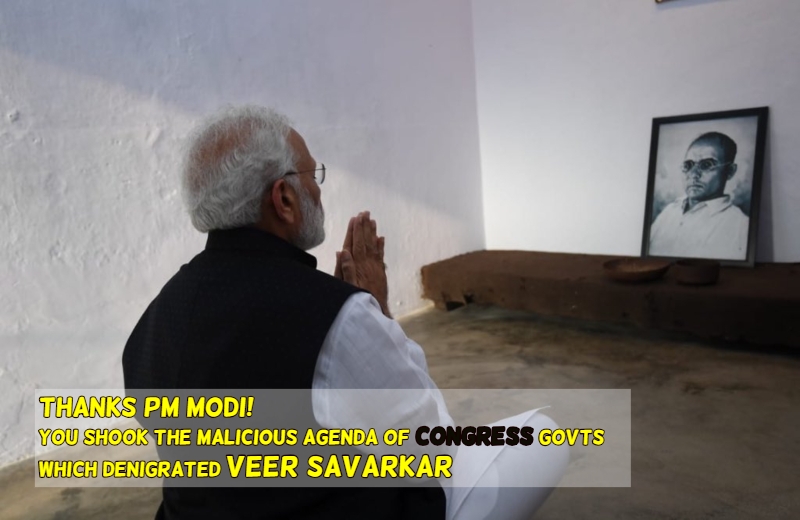With this gesture, you dared the outlook of Congress govts which denigrated Veer Savarkar; Thanks PM Modi!

PM Modi expressed his feelings through a tweet where he says: “Among those imprisoned at Cellular Jail was the great Veer Savarkar. I visited the cell where the indomitable Veer Savarkar was lodged. Rigorous imprisonment did not dampen Veer Savarkar’s spirits and he continued to speak and write about a free India from jail too”.
It is not surprising that Savarkar's prison ticket worn around his neck carried the letter 'D' which stood for 'Dangerous'! It was for the Britishers but the Nehru centred Congress Party and the Nehru clan to.
The Congress governments and the Nehru family always kept a wicked eye on Veer Savarkar. Nehru govt even refused to accept Savarkar as a ‘freedom fighter’. After Pundit Nehru's death, it was PM Lal Bahadur Shastri who started paying him pension, which freedom fighters are supposed to get.
Congress didn't let Savarkar live in peace even after independence. He was deceptively accused of role in Mahatma Gandhi's assassination and arrested under preventive detention even when there wasn't a single evidence to even speculate about his role. Later, Savarkar was acquitted by the court when proved that the allegations of his role in Gandhi assassination were baseless.
The Congress was in a revenge mode against the great evolutionary and Veer Savarkar's house was attacked by a Congress mob after Gandhi's assassination. In that attack, his younger brother Narayan Savarkar (another great freedom fighter) was lynched by the mob.
As this was not enough, Savarkar was later again arrested by Nehru govt under preventive detention, this time because Savarkar was against Liaquat-Nehru Pact.
Savarkar’s stanch nationalist views, his fiery revolutionary activities, basic indifferences with Gandhi Ji and his strategic Hindu Rashtra philosophy made him face a denigrated treatment by the Congress and the Leftist historians as no other leader of the freedom struggle was as vilified as Savarkar.
Here are some noteworthy facts about Veer Savarkar
 In 1910, Veer Savarkar was sentenced to transportation for life, twice to the Cellular Jail in the Andaman Islands. The Cellular Jail, also known as Kala Pani, was constructed between 1896 and 1906. The sentences of transportation were to be served in succession - a total sentence of 50 years, unparalleled in the history of the British Empire.
In 1910, Veer Savarkar was sentenced to transportation for life, twice to the Cellular Jail in the Andaman Islands. The Cellular Jail, also known as Kala Pani, was constructed between 1896 and 1906. The sentences of transportation were to be served in succession - a total sentence of 50 years, unparalleled in the history of the British Empire.
Earlier on reaching the jail premises, Modi laid a wreath at the Martyr's Column before proceeding towards a cell, where the great revolutionary of his time, Veer Savarkar spent his days in rigorous captivity. After stepping out of the cell, he went to the central tower of the prison and stopped before a marble plaque, where names of jail inmates are inscribed.
(With inputs from Savarkar.org)